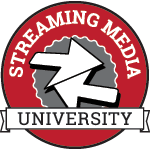
World Class Experts Deliver Content-Rich Training
Streaming Media University features world class experts delivering content-rich training. This series of workshops at our Streaming Media West 2022 event offers attendees the opportunity to get deep-dive training on online video and streaming technologies. Three-hours in length, these workshops give you the sound theories and practiced techniques to become a top performer in the online video field, and with the professional know-how to enhance your career.
All Streaming Media University workshops include a light continental breakfast and morning and afternoon breaks PLUS complimentary access to the Streaming Media Sponsor Showcase on November 15 - 16. Workshops may be registered for separately OR are included with our All Access Pass with Workshops.
Check back soon for workshop details.
Monday, Nov 14
Streaming Media University Workshops
W1. Advanced Codec Implementation & Production
Monday, November 14: 9:00 a.m. - 12:00 p.m.
Located in Grand Ballroom, Salon F
Over the last 5 years, we’ve transitioned from one codec, H.264, to seven or more (H.264, HEVC, VP9, AV1, VVC, EVC, and LCEVC). Keeping track of the performance, implementation status, and royalty status of these technologies has become exceptionally time-consuming, yet it is mission-critical for all encoding professionals. This 3-hour workshop details the implementation status of AV1, VVC, LCEVC, and EVC; discusses competitive quality/performance; and shows how to encode with available encoders. Attendees leave knowing the implementation status of these codecs and production alternatives for encode/decode.
Jan Ozer, Owner, Streaming Learning Center
W2. Integrating NDI Output From Conferencing Platforms
Monday, November 14: 9:00 a.m. - 12:00 p.m.
Located in Grand Ballroom, Salon G
In order to achieve higher-quality video and audio than what consumer webcams and mics offer, live-event video production during the pandemic rapidly accelerated the use of AV capture hardware and versatile outputs like NDI, SRT, and RTMP from popular conferencing tools such as Zoom and Microsoft Teams. While these products enable meeting organizers to directly push RTMP feeds from the cloud to social media destinations and custom ingest servers, the lack of customized layouts in these feeds creates new opportunities for webcasters to produce better-looking, fully branded live streams for their clients. Nearly every trade software product for video switching supports NDI, including OBS, Telestream Wirecast, vMix, and more. In this workshop, learn how to enhance the production values of your next virtual or hybrid event with high-quality sources derived from Zoom and Microsoft Teams. Learn about the differences between Zoom (Zoom Meetings, Webinar, and Rooms) and Microsoft Teams (Presenter Mode, PowerPoint Live, and Live Events) and how those modes affect your production process.
Robert Reinhardt, Streaming Solutions Architect, videoRx
W3. How to Set Up a FAST Service
Monday, November 14: 1:00 p.m. - 4:00 p.m.
Located in Grand Ballroom, Salon F
Free ad-supported television (FAST) has become a must-have for every streaming service, and this workshop takes you through the crucial steps required to set one up. We walk through the types of tools and SaaS you can use to get up and running, creating a FAST service from your existing content library. Using tools covered in Streaming Media’s regular Streaming Toolbox feature, we build a service from encoding to playout, with the end result being a targeted, engaging, 24/7 stream. Steps covered include the following:
- CMS content storage and sharing
- Rights clearance for all content
- Inserting SCTE markers or using AI/ML to identify ad breaks
- Changing advertising rules and availability for your content based on the viewing platform
- Supporting contextual metadata to get higher CPM on ad sales
- Outputting to all formats required by the distributor’s requirements
- Meeting subtitle and language requirements
- Programming a 24/7 feed
- Mixing live and library content
Nadine Krefetz, Consultant, Reality Software and Contributing Editor, Streaming Media
W4. FFmpeg 5.0 Advanced: Working With Multiple Sources, Inputs, & Outputs
Monday, November 14: 1:00 p.m. - 4:00 p.m.
Located in Grand Ballroom, Salon G
At the start of this year, FFmpeg 5.0 (codenamed "Lorentz") was released as a major upgrade from previous versions. This workshop guides you through the changes that might affect your current FFmpeg processes and workflow, as well as introduces you to more challenging FFmpeg features. If you’re already familiar with the basics of FFmpeg operation, you’re ready to tackle more ambitious tasks with one of the most powerful compositing tools available. We explore composition of two video sources with text labels and placement, setting up multiple processes to output multiple bitrates for adaptive delivery, using the “tee muxer” to distribute one encoding process to several outputs, and accessing connected hardware (e.g., webcams, AV capture devices) and networked hardware (e.g., IP cameras) as inputs to FFmpeg processes. Note: A diagnostic test is available for attendees to determine whether they’re prepared for this advanced workshop. Click here for a quick quiz on your FFmpeg knowledge: http://go2sm.com/ffmpegdiagnostic.
Robert Reinhardt, Streaming Solutions Architect, videoRx
VIP Mixer
Monday, November 14: 5:00 p.m. - 6:15 p.m.
Located in Lighthouse Courtyard
Enjoy drinks, tasty bites, and beautiful views from the Hyatt resort lawn while you mix and mingle with other conference attendees, speakers, and exhibitors to kick-off your Streaming Media West experience.


